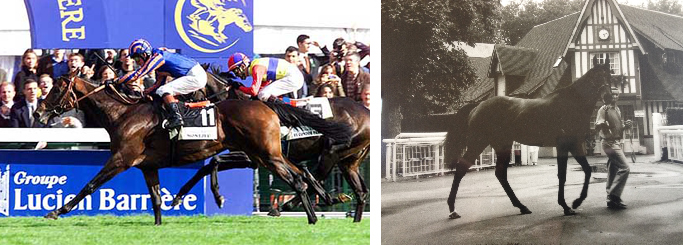Based in the United Kingdom until the 1980s, Sir James married two more times and had seven more children: Ginette Lery with whom he had Manes and Alix, and Lady Annabel Birley, with whom he had Jemima, Zacharias and Ben. He had a lasting relationship with Laure Boulay de la Meurthe, who he also introduced as his wife and with whom he had two children, Jethro and Charlotte.
Sir James stayed on friendly terms with his former wives, and was close to all his children. In many ways, although he felt a foreigner in both England and France, his extended family was the one domain in which he not only felt part of, but which he had created.
Sir James was given a knighthood by outgoing Labour prime minister Harold Wilson in 1976, for services to exports and ecology. He also won the Communicator of the Year award from the British Association of Industrial Editors in 1980.
Alongside his business, political and environmental interests, Sir James took his unconventional approach to the world of horserace breeding. He bred a Sadler’s Wells foal and against all expert advice, insisted it be kept in a sloping field sown with wild herbs and vegetables. Named Montjeu after his French chateaux, Sir James predicted the horse would win Europe’s richest race, the Prix de L’Arc de Triomphe. Montjeu duly won the Arc, and has now become one of the pre-eminent stallions of his generation. Sadly Sir James died before Montjeu ever raced and did not get to see the fruits of his extraordinary methods.

Private Eye

In 1975, after he had taken the helm of securities company Slater Walker, Sir James embarked on a long battle with UK satirical magazine Private Eye and its employees, whom he charged with libel in one of the most famous UK cases of its kind. The magazine had published an article suggesting Sir James orchestrated an obstruction of justice in the case of Lord Lucan’s disappearance, along with further articles casting doubt on Sir James’s character in relation to Slater Walker’s dealings in the Far East.
Sir James issued sixty-three writs for libel against Private Eye and another thirty-seven against its distributors, and then applied to the High Court to bring proceedings for criminal libel in regards to the Lucan case.
The case was settled eleven days before the criminal libel case was due to begin in May 1977, with a compensation paid to Sir James along with a full-page advertisement, paid for by Private Eye, in which the magazine admitted there was ‘not a shred of truth’ in any of the libels.
Following the settlement, Sir James became a strong advocate for transparent reporting and press standards in general.
He left the UK in 1981 for New York, where he would remain until 1987.
Cuixmala
After the 1987 stock market crash, Sir James built an estate in Mexico, on the Costa Cuixmala. The architect was Robert Couturier, the thirty-two-year-old scion of an old aristocratic French family.
Part of Sir James’s dream was to make the property an entirely self-sufficient ecological haven. A variety of fruit trees and vegetables were planted, seafood was taken from the sea, and meat from inland cattle-ranches. The waterways swarmed with American crocodiles, and jaguars, while ocelots and pumas roamed his property from the hills beyond. One of Mexico’s leading ecologists, Dr Gerardo Ceballos, called it a ‘biodiversity hotspot’, with more than 1200 plant species, 270 bird species, seventy mammals, sixty-eight reptiles and nineteen amphibians; many of which only survived in dry tropical forests, to which Sir James added giraffes, zebras and antelope.

For more on Sir James’s work as an environmentalist, see here
Sir James also established the Chamela-Cuixmala Biosphere reserve in conjunction with the National University of Mexico, which was the first private reserve in Mexico to protect tropical dry forest and its species.
For more on Sir James’s work as an environmentalist, see here
Sir James then returned to the UK for one last major takeover bid for tobacco-conglomerate BAT, and spent time in both France and UK as a politician and leader of parties campaigning against the Maastricht Treaty and the proposed European Union.
Memorial Service
“A giant among men – great in his qualities and great in his impact, one of the most powerful and dynamic personalities that this generation has seen… this magnificent warrior for truth … We shall never see his likes again.” – former Prime Minister Baroness Margaret Thatcher
Shortly after the 1997 UK General Election, Sir James lost his battle with cancer. He passed away on July 21, 1997, aged sixty-three, at his Spanish estate Tramores, and his ashes were scattered off the Mexican coast by his family a few weeks later.
A memorial service was held at St John’s Smith Square in Westminster, London on November 13,1997. More than seven hundred guests, including Baroness Thatcher, Zulu leader Chief Mangosuthu Buthelezi, Lord Jacob Rothschild, and Dr Henry Kissinger, attended to farewell this multifaceted, principled man who had contributed so much and thought so deeply on many important issues.
